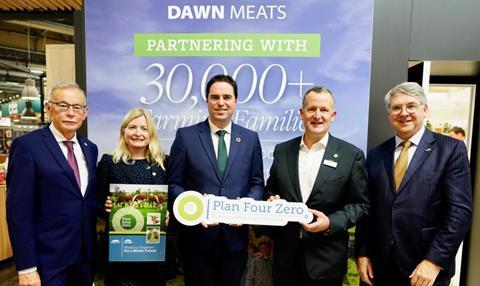Dunbia parent company, Dawn Meats has announced a plan which will see the meat processor target net zero operational emissions across the business by 2040, and work towards a net zero supply chain.

An initial £90 million investment across four areas: environment, farming, food and society, will support the delivery of these targets. According to Dawn Meats, its approach takes account of the entire supply chain across Scope 1, 2, and 3 emissions while also aligning to the UN Sustainable Development Goals.
The 2040 Net Zero Commitment will be structured with a supporting near-term goal. By 2030 Dawn Meats is aiming to reduce Scope 1 and 2 emissions by 59%, through investment in new technology to transform plant infrastructure, transport, thermal energy generation and refrigeration systems,
The Scope 3 supply chain target ambition will be increased to align with 1.5°C, placing the company on a net zero trajectory. Ongoing supplier engagement to reduce emissions and improve farm efficiencies will continue via farming projects and knowledge sharing events. The company will continue to enhance production efficiencies, improve carcase utilisation and derive greater value from their livestock products, which will further reduce emissions intensity.
Other targets include ensuring 100% of their plastic packaging is reusable, recyclable or compostable and sourcing 100% of their cattle and sheep from Bord Bia assured farms in Ireland, and Red Tractor assured farms in the United Kingdom.
Plan Four Zero is the culmination of years of significant work Dawn Meats has undertaken to understand and combat emissions in the agriculture and food processing industry. They were the first European beef and lamb processor to set science-based targets and measure its progress on externally verified sustainability goals.
The Group’s most recent sustainability report highlighted a 248,000-tonne reduction in greenhouse gases from its operations and supply chain in 2020, while on-farm Scope 3 emissions reduced by 189,000t. For the year ending 2021, the Group achieved a 40% reduction in Scope 1 and 2 emissions and a 15% reduction in Scope 3 emissions intensity.
Supplier data will increasingly be used to calculate more accurate carbon footprints for Dawn Meats’ and Dunbia’s beef and lamb products. The company said that sharing these product carbon footprints with their customers is “an important step” in linking supply chain data and developing a consistent approach to measurement, allowing the company’s customers to demonstrate progress against their climate targets.
It said: “The Carbon Trust will independently verify the methodology, ensuring credibility and transparency, allowing us to report to a recognised standard.”
Industry collaboration is vital
Niall Browne, CEO of Dawn Meats and Dunbia, said: “Addressing climate change is one of the key challenges of our time. Dawn Meats has an opportunity to continue to positively impact the supply chain as well as our communities and environment, and a commitment to achieving net zero operational emissions by 2040 is a goal which is the culmination of significant progress to date.
“Our leadership and wider team across Ireland and the UK are fully focused on delivering this goal and while we are proud of our achievements to date, we recognise there is much still to do.”
Gill Higgins, group sustainability director at Dawn Meats and Dunbia, said: “We have consistently set ambitious targets when it comes to addressing climate change, which is necessary to face the enormous challenge in front of us. Through working with our primary producers and wider supply chain partners on innovative approaches to food production and packaging we have an opportunity to address Scope 3 emissions in a meaningful way. These are emissions which are amongst the most difficult to combat, but industry collaboration is vital in working toward Net Zero.”
This story was originally published on a previous version of the Meat Management website and so there may be some missing images and formatting issues.












